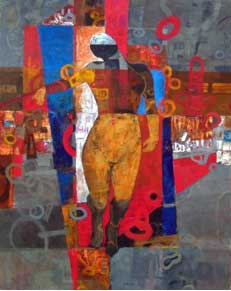By Sandra Lommasson
 The telling of our sacred stories unfolded over a weekend in response to the prompt, "What have been the major graces of your life?"
The telling of our sacred stories unfolded over a weekend in response to the prompt, "What have been the major graces of your life?"
Tears and laughter flowed with each telling -- bodily responses that are unique to human beings. I call this flow of body-talk ‘Living Water,' a pointer toward and expression of Immanu-el, Christ-with-us. The presence of each emotion is unmistakable and concrete, as are the human experiences from which they come. Christ lives in the places of wounding and healing across generations, in the yearning for and struggle with vocation, in moments of mercy imperfectly offered and haltingly received, in chronic illness and robust health -- in whatever is Real. One participant said simply at the end of our time, "Spirit wants to incarnate."
Preparing for and celebrating incarnation is how the cycle of each Christian year begins. The ‘in-meatness' of God is both scandal and gift. This indwelling, upwelling presence of the Holy in and among us, here and now, abiding in the griefs and graces of every day makes the separation of the spiritual and bodily impossible. They are wed. Christ was not simply Christ, but Jesus, the Christ, a marriage, concrete and specific. Spirit wants to incarnate... and does.
Even more remarkable, such incarnation is not something we simply look back upon as an historical recounting from the life of Jesus. As Alexander Shaia so beautifully points out in his new work The Hidden Power of the Gospels: Four Questions, Four Paths, One Journey, we have fallen into the bad habit of viewing the gospels as the biography of Jesus. It distances us from the gospels as our embodiedstory today as people of The Way.
The gospels were born of specific communities living in concrete situations that followed The Way of Christ and experienced the Risen One together in their circumstances. It's all about embodiment. We do not follow this Way on our own, but as a flesh and blood people of ‘two or more.' In doing so, we participate in the second incarnation, the improbable assemblage of the Body of Christ. In this world, Christ Я Us.
Symeon the New Theologian wrote in the 10th century, "We awaken in Christ's body/as Christ awakens our bodies..." Each flows into the other, expression of the Living Water. In ancient baptismal ritual, the early church initiated new converts into a hard, joyful life of sure oppression, probable death, and irrepressible joy. This entry into the community was no merely mental assent to a set of beliefs, but immersion into a quality of life that was unmistakable in a time of rampant bleakness. There was nothing convenient about this faith; there was, however, something compellingly alive.
As each rose from this water of baptism, the presider announced the startling arrival of a new brother or sister as, "John, a Christ!" "Sarah, a Christ!" It was both intensely personal and communal. The individual awakens in the awakening community. Notice how the "I" and the "we" marry as Symeon continues his mystical poem (italics are mine):
And let yourself receive the one
Who is opening to you so deeply.
For if we genuinely love Him,
we wake up inside Christ's body
where all our body, all over,
every most hidden part of it,
is realized in joy as Him,
and He makes us, utterly, real,
and everything that is hurt, everything
that seemed to us dark, harsh, shameful,
maimed, ugly, irreparably
damaged, is in Him transformed
and recognized as whole, as lovely,
and radiant in His light.
We awaken as the Beloved
in every last part of our body.
This is not a whitewashed body, but a real one with damage that is amazingly transformed. In The Holy Longing, Ronald Rolheiser writes, "Part of the very essence of Christianity is to be together in a concrete community, with all the real human faults that are there and the tensions this will bring us... a Christian spirituality is always as much about dealing with each other as it is about dealing with God."
A fully alive human being/community radiates life that attracts and disrupts. It's palpable, as real as the arms and legs and beating heart of the human body. This person, this community is free -- not just free from, but free for authentic service in this world of God's heart. We awaken in Christ's body as Christ awakens our bodies to fullness of life in the real flesh-and-blood circumstance in which we find ourselves.




